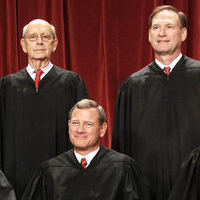Three Supreme Court Justices have been Ruling on Cases Involving Companies Whose Stock they Own
 Justices Stephen Breyer (L), Samuel Alito (R) and John Roberts (middle) (photo: Pablo Martinez Monsivais, AP)
Justices Stephen Breyer (L), Samuel Alito (R) and John Roberts (middle) (photo: Pablo Martinez Monsivais, AP)
The Supreme Court’s top justice and two associate justices have repeatedly ruled in cases involving companies in which they owned stock, according to a court watchdog group.
The organization Fix the Court says in a report (pdf) that Chief Justice John Roberts and Associate Justices Stephen Breyer and Samuel Alito have created potential conflicts of interest by participating in decisions that potentially affected their stock portfolio.
Fix the Court reviewed cases heard by the court between 2009 and 2013, and focused on 19 cases in which the three justices owned stock in companies that filed “friend of the court” or amicus curiae briefs. The report says that, in those cases, 68% of the time Roberts, Breyer and Alito sided with the companies in which they owned stock.
The other six justices were omitted from the study because they don’t own a significant amount of common stock in individual companies.
The 19 conflict-of-interest cases involved such matters as mandatory arbitration, affirmative action, and corporate immunity for international law violations.
Examples provided by Fix the Court include three class-action cases, Wal-Mart v. Dukes (pdf), AT&T v. Concepcion (pdf), and Comcast v. Behrend (pdf), in which Roberts owned up to $100,000 in shares of Intel (which filed a brief in support of Comcast); up to $100,000 in shares of Dell (which supported AT&T) and up to $400,000 combined in shares of Intel, Microsoft and Hewlett-Packard (which filed for Wal-Mart).
In another case, Kiobel v. Royal Dutch Petroleum (pdf), Breyer and Alito sided with the defendant, which was supported by IBM (Breyer owned up to $50,000 in shares) and by Caterpillar, Chevron, ConocoPhillips, IBM and Proctor & Gamble (Alito owned as much as $280,000 in these companies).
Not once did any of the justices recuse himself from a case due to an amicus-related conflict of interest, according to Fix the Court.
-Noel Brinkerhoff
To Learn More:
Blind Trust (Fix the Court) (pdf)
- Top Stories
- Unusual News
- Where is the Money Going?
- Controversies
- U.S. and the World
- Appointments and Resignations
- Latest News
- Trump to Stop Deportations If…
- Trump Denounces World Series
- What If China Invaded the United States?
- Donald Trump Has a Mental Health Problem and It Has a Name
- Trump Goes on Renaming Frenzy






Comments